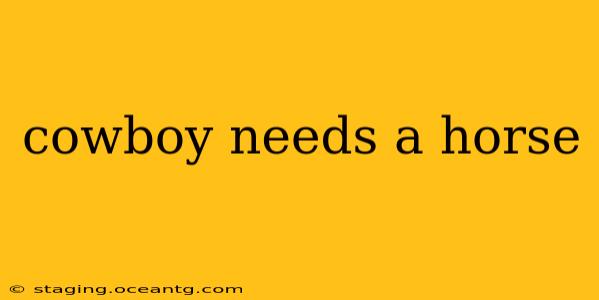The image of a cowboy effortlessly riding across the plains is iconic. But behind that image is a deep bond, a partnership forged between a man and his horse. Finding the right horse isn't just about finding a mount; it's about finding a partner, a confidante, a reflection of the cowboy's own spirit. This journey requires careful consideration, understanding the nuances of horse breeds, temperaments, and training.
What Kind of Horse Does a Cowboy Need?
This isn't a one-size-fits-all answer. The ideal horse for a cowboy depends heavily on the type of work they do. A ranch hand working cattle needs a different horse than a rodeo competitor. However, several qualities are highly valued across the board:
- Stamina: Cowboys often spend long hours in the saddle. A horse needs to be tough, enduring, and able to handle challenging terrain and weather conditions.
- Intelligence and Trainability: A horse that's easy to train and understands commands is crucial for safety and efficiency. A quick learner is a valuable asset on the range.
- Surefootedness: Navigating rugged terrain requires a horse that's surefooted and agile. A horse prone to stumbling can be dangerous for both rider and animal.
- Temperament: A calm, dependable temperament is vital. A horse that's easily spooked or prone to aggressive behavior isn't suitable for a working cowboy.
What Breeds Are Popular Among Cowboys?
Several breeds have historically been favored by cowboys for their combination of strength, stamina, and trainability:
- Quarter Horses: Known for their agility, strength, and calm temperament, Quarter Horses are incredibly versatile and are a popular choice for ranch work and rodeos.
- Appaloosas: These striking horses are known for their spotted coats and their intelligence and willingness to work.
- Mustangs: While often requiring more training, Mustangs are known for their incredible stamina and resilience, making them well-suited for tough ranch work.
- Paint Horses: A blend of Quarter Horse and Thoroughbred bloodlines, Paint Horses combine the athleticism of the Thoroughbred with the calm temperament of the Quarter Horse.
How Do I Find the Right Horse for My Needs?
Finding the perfect horse takes time and patience. Here's a breakdown of the process:
- Assess Your Needs: Before you start looking, honestly evaluate your riding skills and the type of work you'll be doing.
- Seek Advice: Talk to experienced cowboys and horse professionals. They can offer invaluable advice and guidance.
- Visit Reputable Breeders and Trainers: Don't rush into a purchase. Spend time observing horses in various situations.
- Try Before You Buy: Always test ride a horse before committing to a purchase. This is essential to assess its temperament and suitability.
- Consider Age and Training: A younger horse will require more training, while an older, well-trained horse might be a better fit for a less experienced rider.
What About the Cost of Owning a Horse?
Owning a horse is a significant financial commitment. Costs include:
- Purchase Price: This can vary dramatically depending on breed, age, and training.
- Boarding: This covers stabling, feed, and general care.
- Veterinary Care: Routine check-ups, vaccinations, and potential emergencies.
- Farrier Services: Regular hoof trimming and shoeing.
- Equipment: Saddles, bridles, and other riding gear.
Owning a horse is a huge responsibility. It requires dedication, time, and a significant financial commitment. But the bond between a cowboy and his horse is a unique and rewarding relationship, making the effort worthwhile for those dedicated to the Western lifestyle.
